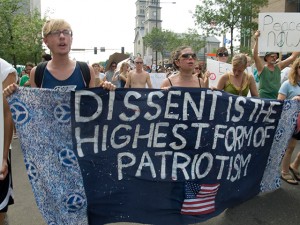The first Earth Day was on April 22, 1970. After almost fifty years of environmental activism, however, the most profound challenges facing our globe, including climate change, pollution, and resource depletion, have yet to be adequately addressed. While studying the current environmental movements and theory is crucial to understanding our present crises, it is even more important to encourage students, not to follow in their predecessors’ footsteps, but to conceptualize new forms of dissent that might be more successful at inciting agency and substantial change than past efforts. This summer, I had the opportunity to work with Professor Pinar Batur, Director of Environmental Studies, to create the syllabi for two Environmental Studies Senior Seminars in which the participants will evaluate current political and economic structures and seek to imagine more successful counter-protest movements. Both of these seminars include class projects where students address a corresponding environmental issue on campus and the Hudson Valley to foster praxis.
SENIOR SEMINAR IN THEORY AND PRACTICE: LET’S TALK TRASH!
The first Senior Seminar syllabus I organized with Professor Batur was “Let’s Talk Trash,” which focuses on all aspects of waste including the American culture of disposability, the production of waste in a capitalist system, and the unsustainable dumping of all of this trash into landfills, incinerators, and waterways. This seminar also studies how waste became a form of environmental racism as most waste disposal areas are disproportionately placed in poor, minority communities and analyzes the social movements that erupted as a response to these injustices. The seminar will culminate with a class project that uses Vassar as a center for a comprehensive anti-trash movement by focusing on food waste at Vassar, sustainable systems and trash education in the area, and recycling.

SENIOR SEMINAR IN THEORY AND PRACTICE: DISSENT IN THE ANTHROPOCENE
The second syllabus I worked on combined many different types of readings such as plays and novels with social theory and environmental research to give students a broad theoretical understanding of dissent in the context of environmental movements. This seminar will specifically focus on climate change with discussions on the shortcomings of the current political and social responses and projects that challenge students to conceptualize other forms of dissent that will incite more international agency on this pressing issue. This seminar has been scheduled for the Spring 2015.
Student Project: I also had the opportunity to work on an independent project. I chose to research and document the role of Vassar College and Alumni in dissent and its various articulations. I have contacted and interviewed Vassar alumni who work in the “environmental field” including lobbying, agriculture, business, and nonprofit organizations. In these interviews, I will aim to find out how Vassar students begin a career in the environmental field and understand if and how these students can create a culture of dissent from the status quo while working within current power structures.


